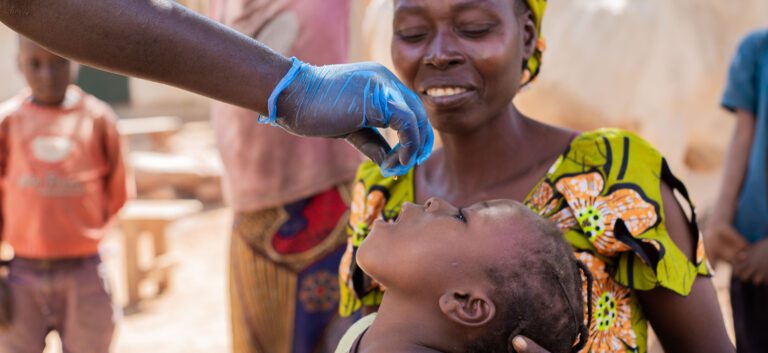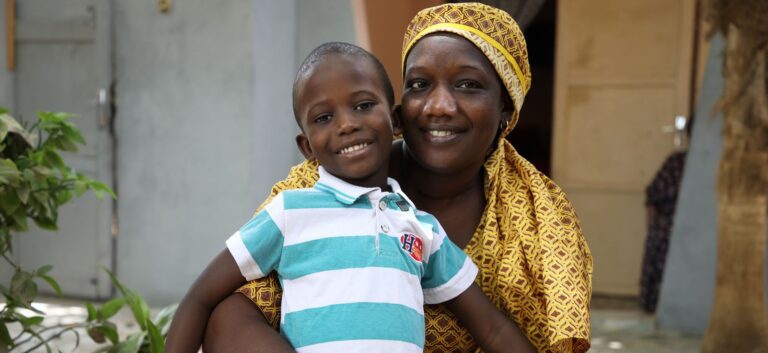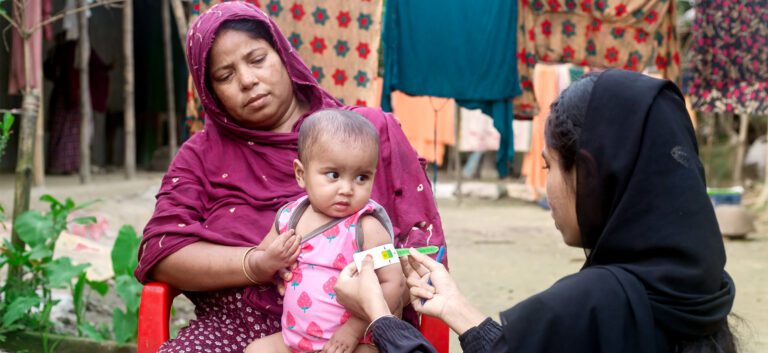Voice from the Field: Pooja Pandey Rana
At the 2017 Spirit of Helen Keller Gala, Pooja Pandey Rana discussed the most rewarding aspects of her work, and the woman who inspires her commitment to improving lives.
Namaste! Good evening, ladies and gentlemen. My name is Pooja Pandey Rana. I serve as Deputy Chief of Party for Helen Keller International’s Integrated Nutrition Project in Nepal.
I am so honored to be here. And I am proud to represent more than 900 dedicated HKI field staff who work in Nepal and 20 other countries around the world.
This is my eighth year of working with Helen Keller Intl. I love coming to work every day! Why? Because I believe the work we do matters. We touch people’s lives, and we make a real difference. I love my work because it connects me with people from so many of Nepal’s diverse ethnic groups. As you may know, Nepal’s geography ranges from the very top of the world, on Mount Everest, to the great plains of the Terai. Our people are just as diverse.
Being able to interact with this richness is an experience all by itself. My job also brings me close to the complexities of life in rural areas, particularly for women. It pushes me to develop creative solutions that will motivate mothers, fathers, and grandparents—the whole family!—to adopt practices that will help their families become healthier.
In Nepal, as in other countries where Helen Keller International works, there are many social and cultural barriers to improving health. For example, taboos about certain foods for pregnant moms and kids often keep them from receiving the care and nutrition they need. Undernutrition is not just a lack of food. It also means a lack of access to diverse, nutritious foods; clean water and sanitation; and education for moms about proper feeding for infants and children.
And undernutrition is a most serious problem for children. It has devastating effects on children’s health—not only when they are small, but throughout their lives. Even if a young child does not die as a result of being undernourished, her growth may be permanently stunted. Her ability to learn and perform in school suffers. And she will have diminished capacity to earn a living as an adult. Helen Keller is renowned for implementing evidence-focused research. We create programs that deliver smart solutions to serious challenges like undernutrition.
Working in my home country on the Suaahara project—one of Helen Keller’s flagship programs—has been very rewarding for me. As Kathy mentioned earlier, Suaahara means “good nutrition” in Nepali. The program takes a cutting-edge approach: it engages whole communities to improve the nutrition of pregnant and lactating women and children under two years of age. And the scale of Suaahara is massive. Our target is to help 1.5 million people by the year 2021.
Every year, we are reaching hundreds of thousands of families across the country, particularly from disadvantaged groups. In Nepal, some of these groups were once considered “untouchable” castes. They are still among the poorest, and they have significantly lower levels of health, education and income. Fortunately, the gap is closing, thanks to HKI’s comprehensive efforts. We are establishing basic health care, improving sanitation, building livelihoods, and creating resilient communities.
For example, just one week after the devastating earthquake that hit Nepal in April 2015, I visited a woman whose family has been helped through Suaahara. Her name is Ranju, and she is a village model farmer. From Helen Keller, she has received nutrition education, agricultural training, and the tools needed for growing nutritious vegetables and raising chickens that better feed her family. Ranju told me how she watched as her house collapsed and everything that her family owned was destroyed. I was amazed that she had not given up. She told me, “From the five young chicks that Suaahara gave me . . . I had increased them to 18 . . . but I could only save five.”
Ranju knows how precious those chickens are. Just getting them to her village high in the mountains took a team of porters—each carrying 40 chickens—one week to travel on foot across rugged terrain! Beyond providing nourishing eggs, a chicken can be sold in the market, fetching a price that helps families to buy other household essentials… …and to send their kids to school. So, after the earthquake, Ranju began again. She and her husband salvaged what they could, built a temporary shelter and toilet . . . and constructed a new chicken coop. Women like Ranju inspire me. They work hard to strengthen their families. And they share what they learn with other women. This, in turn, helps to strengthen their communities.
But their strength is not infinite. These women need help to revive their small farms. They need seeds and tools. They need access to animal vaccines and feed. That’s where Helen Keller Intl—with your support—makes all the difference. Together we are ensuring that these families have more nutritious food to eat, gain new skills, and increase their incomes. I want to share with you my favorite Helen Keller quote: “Life is an exciting business, and most exciting when it is lived for others.”
Thank you for taking part in the exciting business of nurturing communities, fostering good health, building confidence among disadvantaged families, and bringing hope for the future.
Together, we can do it! Thank you very much!



